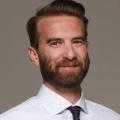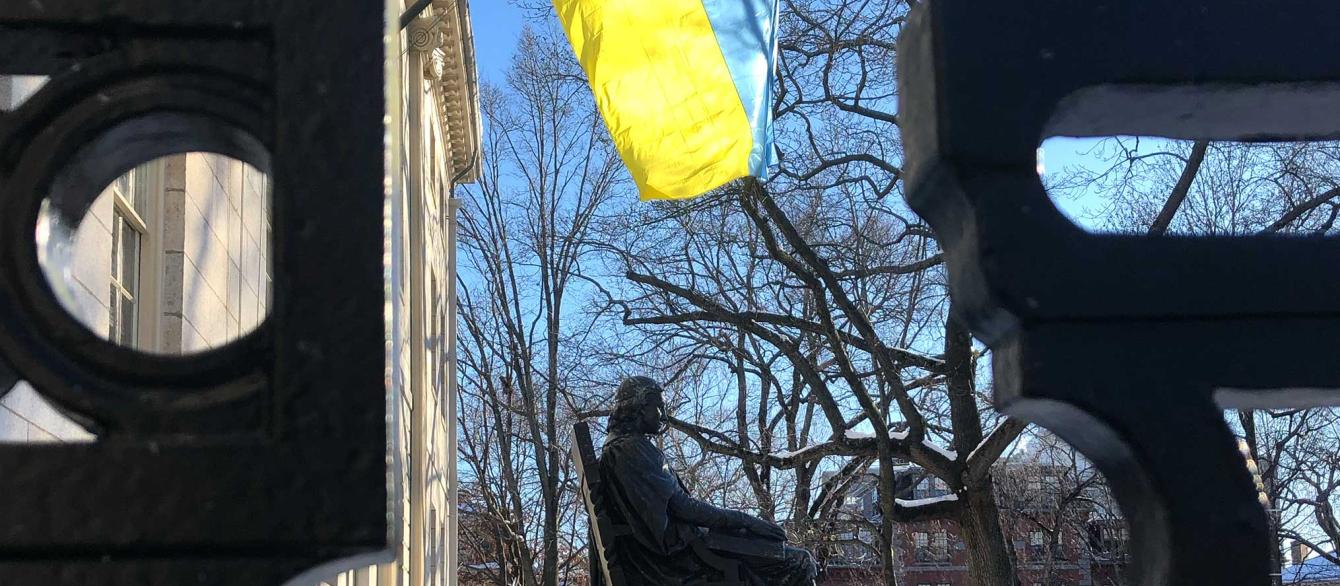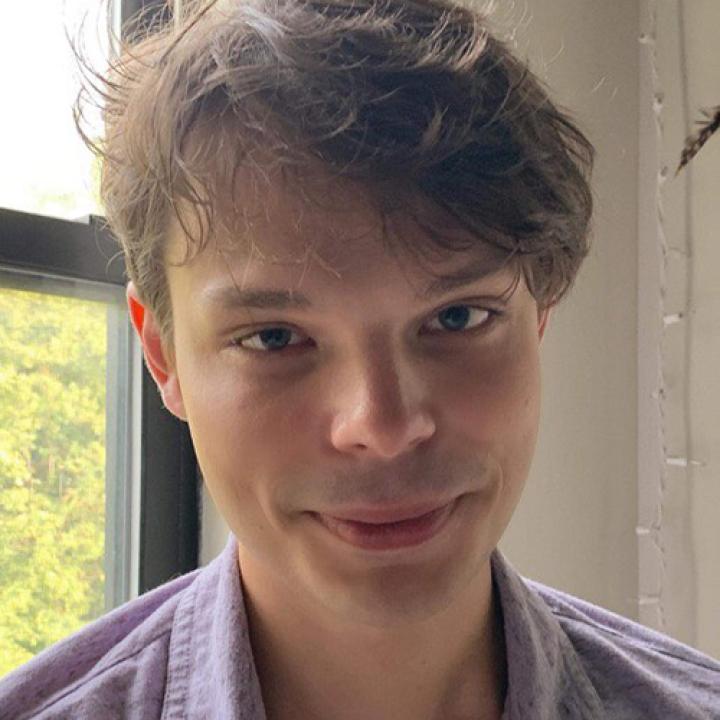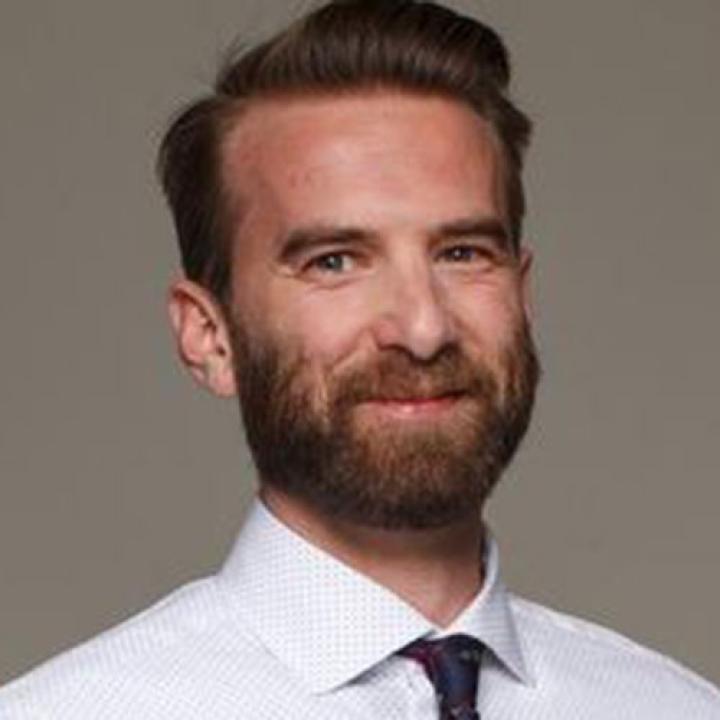Vladimir Putin's invasion and war on Ukraine is a crisis. It's a crisis that is unfolding before our very eyes across social media and cable and online news, and it's more than just a political crisis, though that's likely what most of us are hearing about. Putin's war is crisis of humanity. It's a crisis of conscience…and it's a crisis with deep religious ties.
I'm Jonathan Beasley, and in today's episode of the Harvard Religion Beat, I'm speaking with Sean Eriksen about the religious connection to Putin's war on Ukraine. Sean is a graduate student at the Davis Center for Russian and Eurasian Studies at Harvard University, specializing in contemporary Russian national identity and regime ideology. Sean is originally from Australia. He holds degrees in law and international relations, and he's lived in Kyiv, Ukraine, and has travelled throughout the former Soviet Union.
Harvard Divinity School: Sean, thanks so much for joining me today. I wonder if we could start with just a bit of background about the religious makeup of Russia and Ukraine. Are most people Orthodox Christians in the two countries?
Sean Eriksen: So in Russia, certainly most people are Orthodox Christians. Russia has a particular issue with sort of delving fully into Orthodox Christian nationalism, in the sense that it's extremely big and has a lot of different groups in it and has always had very large Muslim populations. And I think that that problem of alienating those kinds of groups is exacerbated by the fact that these groups tend to be concentrated specifically in geographic regions.
So Putin himself will point out that multiculturalism is a sort of more natural feature of Russian society. Or multi-confessionalism is a more natural feature of Russian society than in the West, where it's based on immigration. So you have places, most notably like Chechnya, where you have a vast, vast majority Muslim population. And that also the central state has to worry, as in the Kremlin has to worry, about separatism. And so they don't want to alienate those kinds of people. And that's not only a religious problem. That's also just basic nationalism problem.
So, Chechnya, there are almost 200 ethnic groups in Russia. And many of them are just like the Chechens. Probably they don't have as strong of an identity, or at least as strong of a desire for separatism in their histories. But certainly, that's a concern that the central government has. So they have to sort of balance this centrality of Orthodox Christianity to the state identity and to the cultural identity of Russia and to the civilization of Russia with the fact that they don't want to alienate all of these groups, and especially in this period of where national identity is so powerful.
HDS: According to the Pew Research Center, nearly 80 percent of adults in Ukraine identify as Orthodox Christian. That’s twice as many who said they were Orthodox in 1991, when the Soviet Union, which was officially atheist, collapsed and Ukraine gained its independence. Orthodox Christianity remains a vital part of Ukraine’s national and political identity. Pew reports that just over half of all Ukrainians say it is “at least somewhat important” for someone to be Orthodox to be truly Ukrainian.
Sean Eriksen: Ukraine is also a fairly religious society. And I know under the previous president, Petro Poroshenko, especially leading up to his election, into the elections where his main competitor was Volodymyr Zelensky, who's the current president who won, he did present himself more as like a true Ukrainian, religious, more religious. And he did also engage in it during his presidency, before he was coming up to elections. He did also build many churches and try to encourage that.
Ukraine is a country that, just as much as in linguistic terms, is to some extent divided. But you want to be careful about exaggerating that, because many, many countries have different languages and different religions while still maintaining a coherent national identity.
So Ukraine has Orthodox Christianity. And then it also has the Greek Catholic. And that's especially focused in the West. And there was obviously some connection between Orthodox Christianity and Russia, which especially motivated, eventually, the Ukrainian church to split in 2019. And they had particularly political reasons for that.
HDS: Archbishop Daniel of the Ukrainian Orthodox Church in the U.S. recently said, “I think the president of Russian Federation is making it a religious war.” And some religious scholars think Putin’s ambition to restore the Russian empire includes reviving the Russian Orthodox Church, which was suppressed under communism and now serves in large part as an echo chamber for Kremlin policy.
So, Sean, how is Putin aligned with the Church in particular? Is he a man of faith or does he use the Church as a political tool?
Sean Eriksen: I think that it's hard to say. I don't think there's very much evidence that he was particularly religious until it became useful, suddenly, in his personal life. He is not particularly devout in terms of his mistresses and, you know, divorce and everything else. But suddenly, he's made it his mission to center the Church. And it wasn't it isn't just him. There was a sense that this was needed after the end of the Soviet Union, because also Yeltsin, the previous president had.
And Putin was always thinking about this. But then in 2012, when he came back, he really started this campaign. And he saw a lot of the problems that he was facing through this lens of that now the ideology of communism is gone. And we're seeing this growth of the spread of foreign ideologies coming into Russia. And that includes Western liberalism.
And when he returned to the presidency in 2012, he was faced with probably the biggest, to this day, the biggest opposition movement.
HDS: Putin was particularly bothered by the establishment in 2019 of the Orthodox Church in Ukraine, therefore splitting from the Russian Orthodox Church in Moscow. Donald Tusk, who’s head of the European People’s Party, recently Tweeted that Putin’s “demands are also connected with the Ukrainian Orthodox Church and its independence from Moscow. De facto what Putin wants is the full capitulation of Ukraine.”
Sean Eriksen: And he really seemed to develop this idea that—and there are many people around him who say this—that because Russia had this ideological void, it was being filled by foreign ideologies. And that what needed to be done was that Russians would be raised in true Russian values. And Putin, himself, would make a comparison between what under Khrushchev was what he called the moral code of the builder of communism, which was kind of like a communist Ten Commandments. And Putin would say, that was nothing. The Communist ideology and morality was nothing but a pathetic copy of the Bible. And so we need to re-center that, so that there isn't this void that is going to be filled by Western liberalism.
And I think that what happened in Ukraine in 2014 could be perceived as a sort of warning of what happens if you let this ideology take off too much, if you let people who he sees fundamentally as Russians become influenced by foreign ideologies. Then they start demanding and moving in a direction politically that is alien to him, is inconvenient to him as an authoritarian dictator.
HDS: What kind of relationship does Putin have with the Russian Orthodox Church in Moscow? Are they sort of complicit in all of this in some way?
Sean Eriksen: In one way, it's a business. And you know, like in anything in Russia, there's a lot of profit to be had by having this level of power that they've gained by their relationship with the State.
Most of the people in the church genuinely do accept that their role is to support the State and that the strengthening of the State is good for the Church, but also as a thing unto itself, for what it does for the Church.
And this is where we come back to this question of, how serious are they about their own beliefs. And this is one of these contradictions in Russia, where even though so many people profit off questionable acting in a way that would seem to be contrary to the interests of their own State, of their own people by enriching themselves, and also maybe conflicting with their own stated values, I think there's a certain cognitive dissonance that goes on there, where they've entered this arrangement with the State and they're happy to help it as much as it can.
HDS: What does it say about Ukraine, its people, and its ideals of religious pluralism that they elected President Zelensky, who is Jewish? He’s not a member of the Orthodox Church, he’s part of the religious minority?
Sean Eriksen: What I would say, from just my personal experience with Ukraine, is that these kinds of identity markers are much less important to people than the feeling that someone is sincere about doing things like ending corruption.
And I certainly believe that the sort of identity tribalism or sort of wanting to be with your own people and stuff definitely matters in Ukraine. But at the same time, I think that this is the priority. And the fact that Zelensky was an outsider, that he wasn't a politician, and that he sort of represented change was absolutely a good thing. I think the I mean I think what it says about Ukraine also, aside from that it was a wise choice, is that there isn't this Nazi problem.
The rhetoric about the de-Nazification and the contradictions of all of that is almost entirely directed at a domestic audience where for decades, even before the end of the Soviet Union, pro-western Ukrainian or Ukrainian nationalism, that was distinct from support for Russia, was associated with Nazi collaborationists. And so this is something that's existed for decades and is an easy analogy to make. And we don't have to worry too much. And we can explain away the fact that in this particular case they've—I mean, the other thing is they don't believe, or at least they don't present, the democracy in Ukraine as being real choice. So I mean, you can sort of see how that goes. Well, the CIA organized the revolution and now they've appointed this Jewish guy to make it seem like they're not Nazis.
HDS: The United States Department of State has ranked Russia as one of the worst in the world for religious freedom.
Knox Thames writes in Religion News Service that: “If Russia’s military campaign is successful, Moscow would likely not countenance an independent Orthodox Church of Ukraine, possibly forcing it back into the family of the Russian Orthodox Church. Russia’s regressive treatment of Jehovah’s Witnesses, Muslims and proselytizing groups would likely be forced on the entire country.”
Thames also points out that concerns about Ukraine’s Jewish community also exist, and that the United States Holocaust Memorial Museum condemned Putin’s “exploitation” of the Holocaust as a pretext for war.
So, Sean, what do you think Russian occupation mean for religious freedom in Ukraine?
Sean Eriksen: I can imagine that freedom of all kinds is going to be extremely limited. You know, Ukrainians do not want a puppet government to be put into the country. There's been some rumors that the president, Yanukovych, who was ousted in the 2014 revolution might be brought back. I would be skeptical that they would. I mean, he was not a sort of charismatic popular figure, obviously, or a competent person, even by the reckoning of Russia.
But yeah. I mean, I think that what's probably going to happen is that something like that the non-Moscow aligned Orthodox churches are going to not be allowed to not be allowed to not be Moscow aligned anymore. And that's probably going to be replaced by people who are going to espouse more pro-Russia lines.
As far as other forms of religious freedom, Russia like I said, has a complicated relationship with this. And I think that just from a rhetorical standpoint, I can't imagine that there would be a significant suppression of, say, Judaism or Islam, because within Russia, Putin will talk all day about how enormously tolerant Russia is of minorities, especially religious minorities. And that that’s essential to national unity.
HDS: In an open letter published on March 1, more than 150 Russian Orthodox clerics called for an immediate stop to the ongoing war in Ukraine. Sean, what's the significance of the letter? What does that say about these cleric’s normal obligation to the State and perhaps a fracturing of that?
Sean Eriksen: People have been paying attention to the fact that there's been a huge degree of resistance in Russian society to this. And there have been, last I checked, about 6,000 people arrested.
Organizations are fined, media organizations are fined for calling this a war even. It's that level of physical repression and information control, that you can't call it a war. It's a special operation. And that's the official language you can use.
So I think that seeing any level of institutional opposition to the conflict, to the war, is an extremely positive sign. And I've said that looking at the lack of anyone within the government saying anything about this, because this is so obviously a terrible idea for so many aspects of Russian society. And in fact, I can't think of who is benefiting from this in any material or rational sense.
So the fact that anyone is willing to say that within that environment, let alone within a sort of pro-State environment, as pro-State of an environment as the Orthodox Church, I think is an extremely positive sign of how many other people are thinking that. Whether that actually manifests in any meaningful change, I'm skeptical. I think that when authoritarian governments take themselves to this level of not caring if something's a good idea, or not caring what the population thinks about it and doing everything to bend people to accepting it, a letter is a good sign of how people are feeling.
But it really does force you force you to think that there needs to be something quite significant at the top elite levels of, not just pressure. But I don't know if under any circumstances Putin is going to back down here. I think he's so committed. I think that for him to pull out now without having achieved his war goals would be to admit that he's made a mistake. As far as I know, I think he hasn't really admitted he's made a mistake since very early on.
And it's not just a mistake. It's a mistake that's killed thousands of, not only Ukrainians, but Russians and destroyed the Russian economy, completely alienated the country from everyone.
HDS: As of March 8, that letter now has over 280 signatures from Russian Orthodox priests denouncing the war. How much influence do those clerics have in their parishes and in their communities? Is this something where they could motivate a new band of opposition and cause real pressure on Putin and Russian authorities?
Sean Eriksen: So first of all, these people are obviously in a very privileged position, in the sense of the State does not want to be seen arresting religious figures in something that is, in general, friendly to the State and in general, where you would never have to be doing that and especially if it's a bunch of them. I think at the same time, there is a point that it could be taken to that it would behave like that. And I mean, I think that they would not be doing that. I think that this is probably as far as they would go. And that's not nothing. I think I would be very, very surprised to imagine that anyone was trying to galvanize religious communities.
I also wonder to what extent in Russia—and I think it depends on where you are and who you talk to—that religious figures have the same level of capacity to mobilize their congregations that you might see in somewhere like the United States, just partly because—this is a general feature of Russian society that people have been expected to withdraw politically for decades, if not forever. And so there isn't a great sense amongst most people that they can do anything about anything.
HDS: Since Sean and I spoke, there are reports that Russia has started enforcing its ban on “discrediting the armed forces,” and one of the first people to be charged is a Russian Orthodox priest. He would face up to 15 years in prison if he’s convicted of doing it again.
This, in addition to thousands of ordinary Russian citizens who have taken to the streets to protest and denounce Putin’s war.
Along with the growing number of clerics who’ve signed the letter calling for an immediate stop to the war in Ukraine, Romanian Orthodox priest Ioan Sauca, who is acting general secretary of the World Council of Churches, urged Russian Orthodox Patriarch Kirill, who is closely aligned with Putin, to try to convince the Russian President to put a stop to the war.
“Please,” he writes. “Raise up your voice and speak on behalf of the suffering brothers and sisters, most of whom are also faithful members of our Orthodox Church.”
I’m Jonathan Beasley and this has been the Harvard Religion Beat. Thanks so much for tuning in. Thanks also to Sean Eriksen for his valuable insight into this very complex yet important issue. And thanks as always to the fabulous Caroline Cataldo for editing today’s episode.
Until next time…
Music credit: "After the Border," InSpectr (Free Music Archive)
This episode was originally released by Harvard Divinity School on March 9, 2022.








